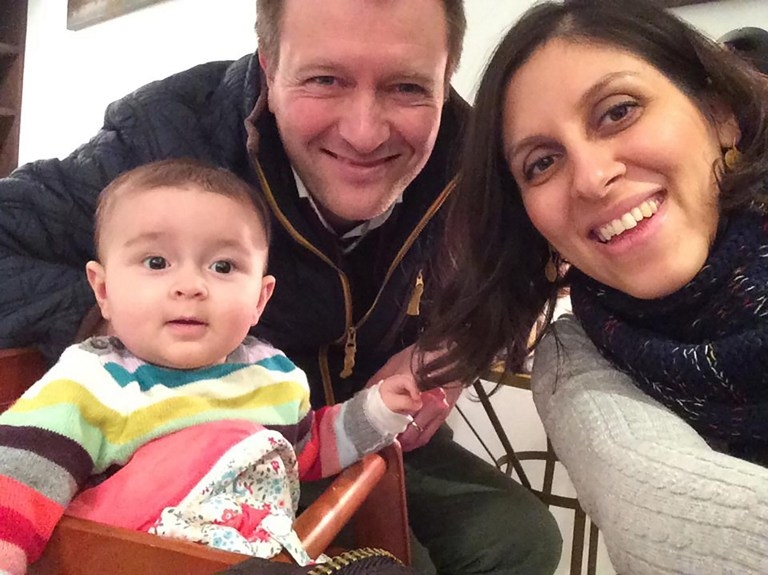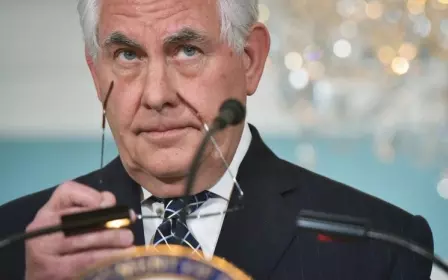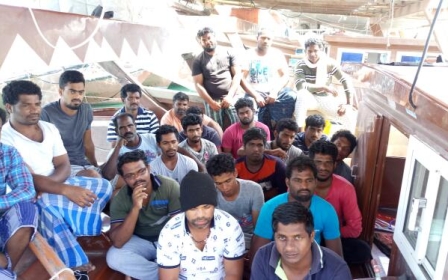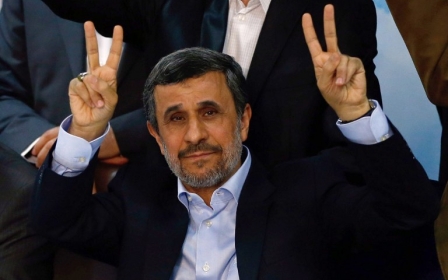Dual nationals are paying a heavy price for UK-Iranian relations

One year. One year can disappear in the blink of an eye, or can feel like a lifetime. Imagine how Richard Ratcliffe feels: he hasn't seen his wife, Nazanin, and their daughter, Gabriella, for a whole year.
Detained as a political bargaining chip, Nazanin Zaghari-Ratcliffe has been held for the past 12 months in a Revolutionary Guard prison on trumped-up charges.
It’s been a year that he’s been seeking answers and help from the British government - all questions and efforts which have been left wanting amid the UK and Iran's evolving ties.
British in Iran and Iranian in Britain
Nazanin’s story starts on 3 April 2016 when she was detained by the Iranian Revolutionary Guard Corps (IRGC). Her case is shrouded in secrecy. Nazanin’s dual national status, a status not recognised by Iran, meant consular access was denied. And Richard was advised at the time that the UK policy on dual nationals was to not intervene unless circumstances were exceptional.
Intervention aside, a handful of former and present prime ministers and foreign secretaries - David Cameron, Theresa May, Philip Hammond and Boris Johnson – have all stonewalled the request to simply condemn Iran for holding Nazanin in what the UN has now called arbitrary detention – an aberration of basic human rights. Some might say these are exceptional circumstances.
Nazanin, who had been working as a project manager with the Thomson Reuters Foundation, has since been sentenced to five years’ imprisonment by the Revolutionary Court, upheld on appeal, for acting as head of recruitment for BBC Farsi (historically viewed with suspicion), something her family and employer say is not even true.
A political campaign
But Nazanin’s detention is part of a broader political campaign against Iranian dual nationals. Since March 2016, when parliamentary elections took place in Iran, someone has been detained almost every month.
They include Nazak Afshar, a French-Iranian arrested in March 2016; Ahmadreza Djalali, a Swedish-Iranian arrested in April 2016; Homa Hoodfar, a Canadian-Iranian arrested in June 2016; and Robin Shahini, an American-Iranian arrested on in July 2016. This list is not exhaustive and other British dual nationals include Kamal Foroughi, arrested in May 2011, and Roya Nobakht, arrested in October 2013.
All were held by Iran’s Revolutionary Guard, Iran’s hardliners and protectors of the Islamic regime who were vehemently opposed to the nuclear deal. Many have therefore seen this as a crackdown on what they claim to be western ‘infiltrators’ and an internal power struggle.
But the arrests have occurred on flimsy if not zero evidence. And Nazanin’s husband thinks the UK’s criticism has been blunted because its intentions are dubious.
Connecting the dots
Recently, Nazanin’s family received a ransom demand from someone claiming to have “connections with the judiciary” which would seem to be an empty move somewhat typical of an economy that exploits vulnerable situations.
But such offers of extortion have not come in isolation.
As Richard has explained, when her grandmother visited Nazanin in prison on 21 June 2016, the senior interrogator in Nazanin’s case asked her to pass a message to him: pressure the UK government to make an agreement. At the time, no one knew what this meant.
Nazanin's actual sentence took some time to be delivered, but it arrived suspiciously last September, the day after the UK and Iran upgraded diplomatic relations and appointed ambassadors to each other’s countries.
Richard said at the time: “Nazanin’s detention and charges have always felt like she and Gabriella are being held as a political bargaining chip for internal and international politics. The fact that she was sentenced with unrecognisable charges the day after the UK embassy was upgraded makes this all the clearer.”
He then came across information that he said suggested that Britain was refusing to pay a debt from an arms deal that took place almost 40 years ago, which was incurred as power changed hands in Iran in 1979.
Underlying motives
Perhaps these political prisoners were held as collateral for the arms deal debt. After all, Washington Post reporter Jason Rezaian, an American dual national and former prisoner, was released along with three other US prisoners after the US government cleared a debt owed to Iran.
And Richard has pointed out that breakdowns in talks during key Iran-UK negotiations have coincided with the capture of UK citizen/dual nationals. Further, before negotiations started with Iran in 2011, the UK position, he said, was that "people were not allowed to be held for 200-plus days, and the government didn't used to stay silent".
But it seems that this is not the only area where debts are owed. Debts still existed, for instance, after sanctions took hold in 2010 and even after they were lifted in January 2016 as a result of the remaining US pre-nuclear sanctions, and joint UK-Iranian operations that had to cease.
For example, BP and the Iranian Oil Company (the National Iranian Oil Company's UK subsidiary) had been jointly operating the Rhum gas field in the North Sea until 2010 when sanctions were imposed. Until recently, BP had been holding around $104.5m owed to the Iranian Oil Company. Debts, therefore, are part and parcel of sanctions.
Another theory worth considering is whether the IRGC remains resentful of past and present international sanctions that have hurt Iran’s economy, and now seek a ’resistance economy’, free of international dependency. They could, therefore, be clearing up shop, strong-arming the UK to ensure debts are repaid for companies that in the past have been linked to the IRGC.
Old habits die hard
In any case, the theory that Nazanin and other dual nationals are being held to ransom – as political pawns in a diplomatic game - is no left-field theory. It’s been a hallmark of an Iranian regime that has in the past centred around prisoner swaps. We still do not know what Iran or its clerical regime want, but the UK’s inaction on behalf of its own citizens means it is participating in the game.
Whether the hand the UK is playing is appeasement or neglect, it doesn’t bode well. Appeasement makes the government vulnerable to further blackmail. Neglect makes its citizens vulnerable for further blackmail.
This is perhaps another hallmark, this time of the Conservative government, which has always prioritised trade relations above human rights concerns. They have done it with Ethiopian political prisoner Andrew Tsege. They have done it over the supply of arms to Saudi Arabia. And they are doing it now.
MPs say the UK needs to get its affairs in order if they want to profit from trade with Iran and to gain access to its oil and gas sector, which is yearning for development and infrastructure.
But this lack of backbone in standing up to new friends will lead to a malleable relationship, with the UK - or at least its vulnerable citizens - being mauled.
The UK has had a long, fraught relationship with Iran. Even though Rouhani’s administration wants to strengthen western ties, the suspicions have run deep – on both sides.
Increasing links with each other is ultimately good for both Iran and the UK to forge a relationship of interdependence. Perhaps this is exactly what the IRGC does not want, but the more trade that occurs between the two countries, the bigger the risk it would be to lose those ties for both. This should be a key driver to maintain diplomatic relations, increasing security, and should work towards rebuilding trust. But surely the UK’s Iranian diaspora are also key to maintaining those links.
That’s why the UK must prioritise human rights and revert to its prior policy of defending its citizens whether they have another passport or not. If there is ever a chance of trust being won on either side, it's time for Nazanin, Kamal Foroughi, Roya Nobakht and all other political prisoners to come home.
- Sophia Akram is a researcher and communications professional with a special interest in human rights particularly across the Middle East and Asia.
The views expressed in this article belong to the author and do not necessarily reflect the editorial policy of Middle East Eye.
Photo: An undated handout image released by the Free Nazanin campaign in London on 10 June 2016 shows Nazanin Zaghari-Ratcliffe (R) posing for a photograph with her husband Richard and daughter Gabriella (L) (AFP)
New MEE newsletter: Jerusalem Dispatch
Sign up to get the latest insights and analysis on Israel-Palestine, alongside Turkey Unpacked and other MEE newsletters
Middle East Eye delivers independent and unrivalled coverage and analysis of the Middle East, North Africa and beyond. To learn more about republishing this content and the associated fees, please fill out this form. More about MEE can be found here.





